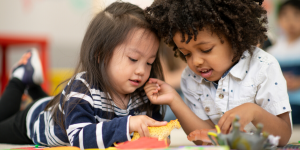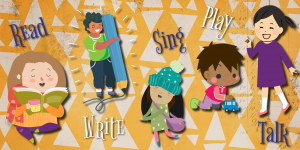
Playing with your child is not only fun—it helps their brains learn and grow! Check out the tips below for ideas about how you can best support your child in playing.
Babies (0-18 months)
- Babies treat books as they would any other toy – they play with them! They might put them in their mouth or pull the pages, and that’s OK. They’re learning how to handle books, how the pages turn. This skill is critical in building a strong foundation for reading.
- Researchers have discovered that children identify letters by their shapes. For example, babies can feel that a ball is round. Later, that will mean a circle and then the letter O. Play with shapes with your child whenever you can.
Toddlers (18-36 months)
- Making animal sounds when you play together is a great way to help your children hear the smaller sounds in words. This will help them when they are learning to read later on.
-
 Try acting out a story with your child, even if they are just repeating a phrase or action. Dramatic play like this helps them begin to understand how stories and sequencing works, which help when it comes time to read.
Try acting out a story with your child, even if they are just repeating a phrase or action. Dramatic play like this helps them begin to understand how stories and sequencing works, which help when it comes time to read. - Play gives you and your child a chance to pretend. As you play, try to add in new vocabulary words. This boosts their vocabulary and makes it more likely that they will remember what the words mean, because they are hearing them in context.
Preschoolers (3-5 year-olds)
- Would you give your child a board game like CandyLand to play by herself? Probably not. Board games are meant to be played together. You can think about apps the same way—better learning and more fun happen when your child plays them with you.
- When your child plays, they often use one object in place of another. For example, a stick might be a magic wand. Symbolic play like this uses the same type of thinking that helps them understand that a written word symbolizes the real thing. Conceptual thinking like this builds your child’s knowledge of the world.
- Play rhyming games with your child. This will help them hear the smaller sounds in words. This skill will help them when it’s time to start reading.
-Kelly, Children's Librarian, Joel D. Valdez Main Library
 Read, Write, Talk, Sing, Play!
Read, Write, Talk, Sing, Play!
Play comes so naturally to children and is an essential element to lifelong success. When children play, they are practicing and perfecting early literacy and life skills!
Read more about early literacy and how you can make a difference in your child's life.

